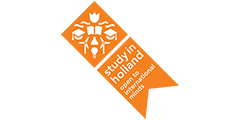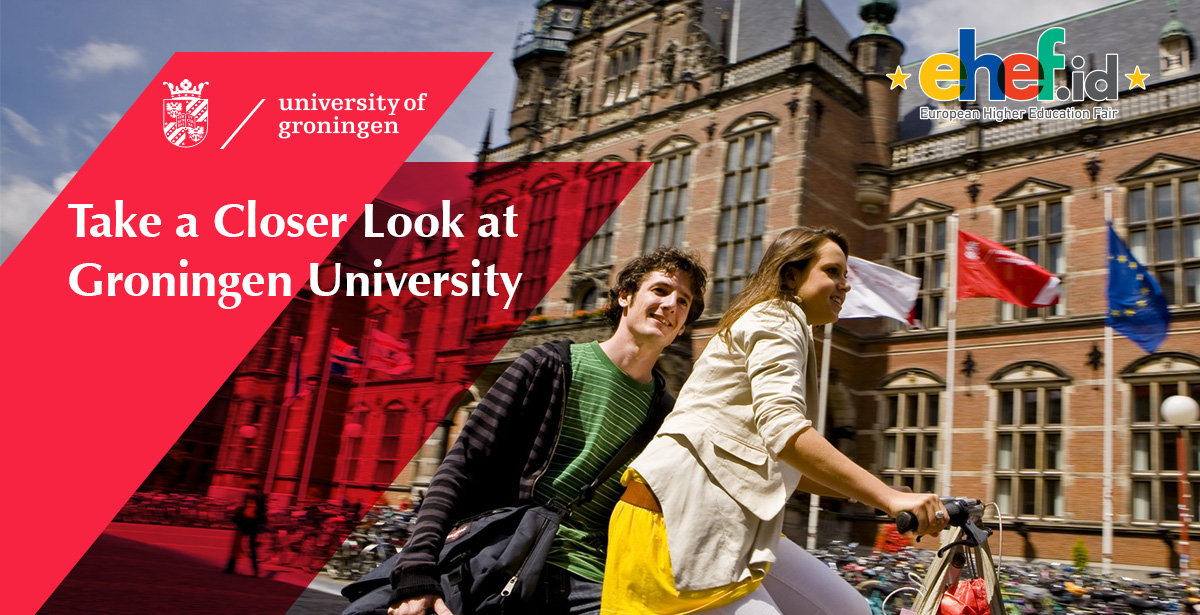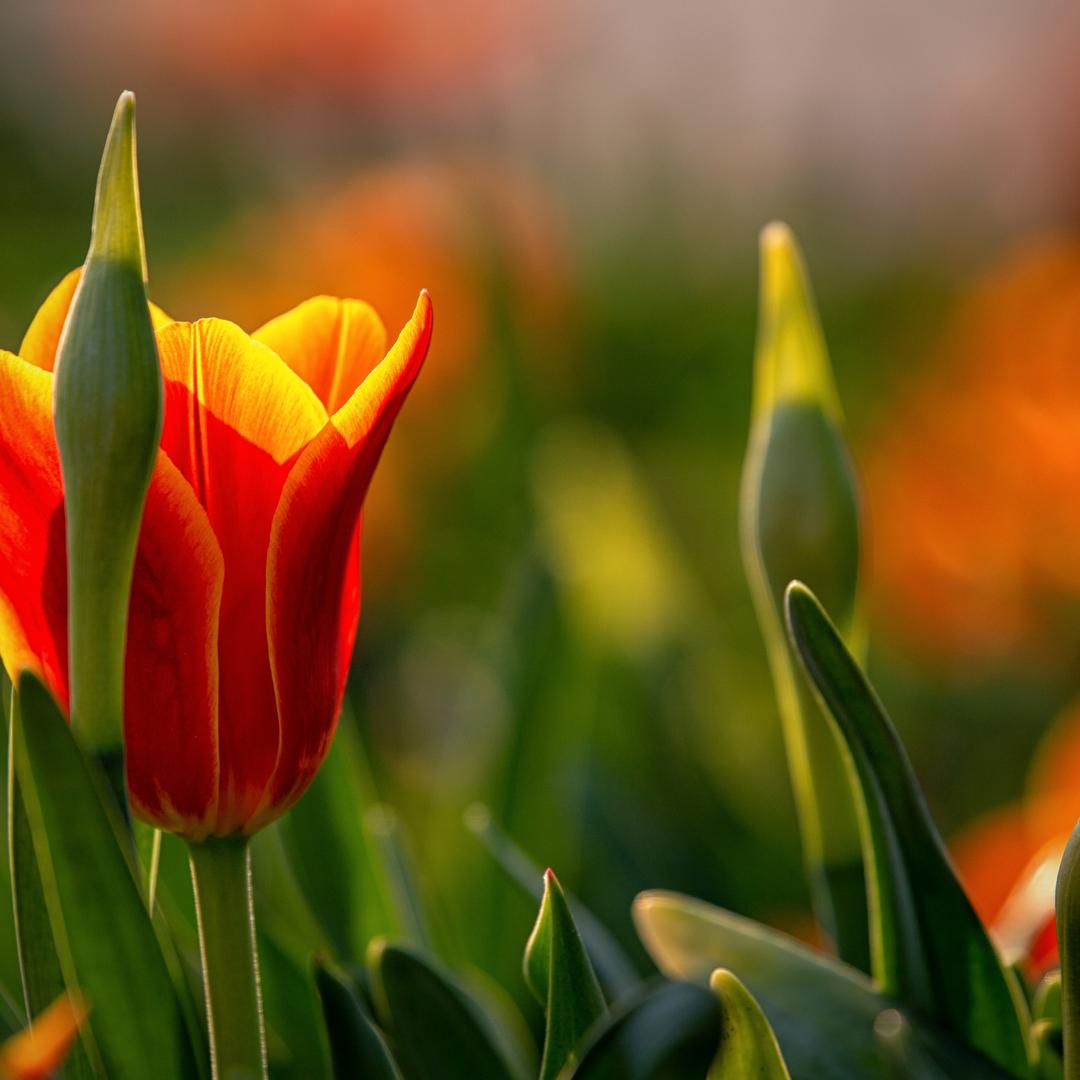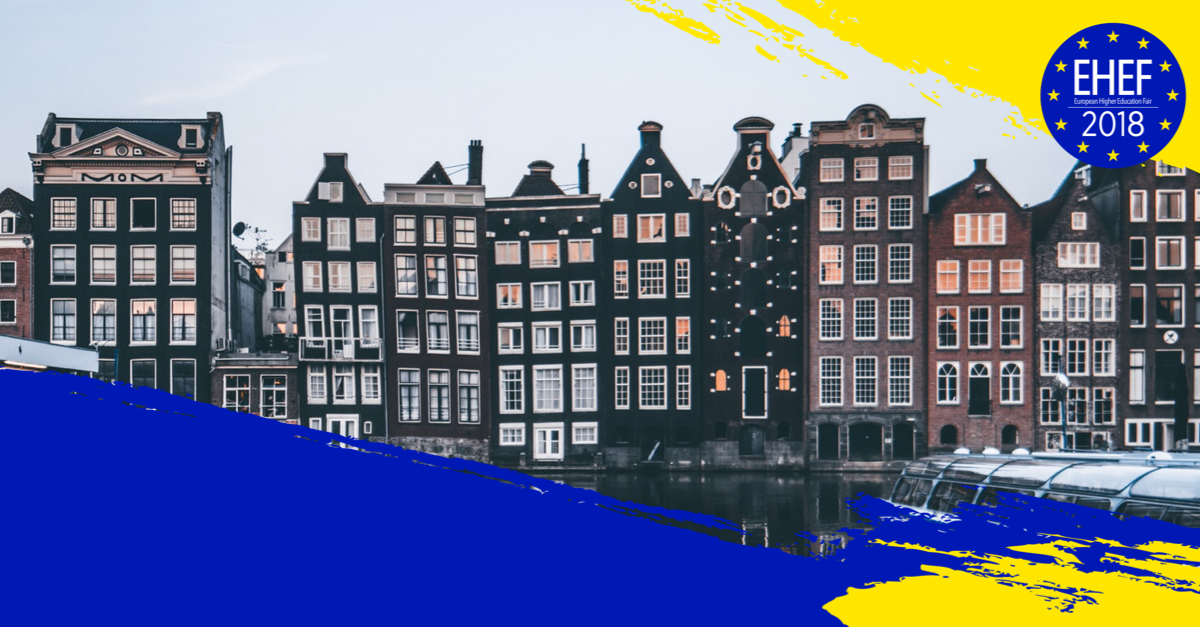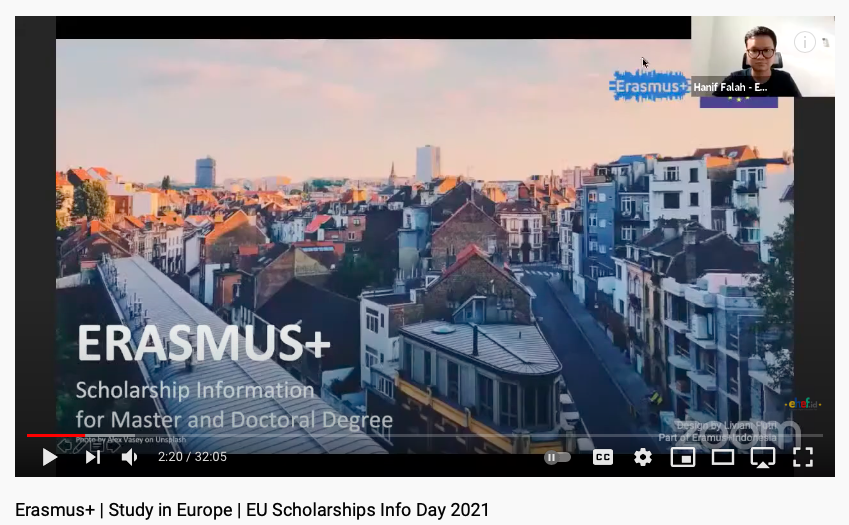
Study in The Netherlands
Last edited on 14 Feb 2026
Welcome to the Netherlands!
The Netherlands gets its name from the fact that around a quarter of this small north western European nation lies below sea level. Beyond its traditional associations (think windmills, tulips, and clogs), it is one of the most developed and wealthy nations in the world, with a largely urban population. One of the most densely populated countries in Europe, it’s known for its tolerant and liberal ethos, and boasts a wealth of great student cities – none of which are more than a bicycle ride (the nation’s preferred mode of transport) away from some picturesque countryside.
The Netherlands is located in north western Europe and is bordered by the North Sea to the north and west, Germany to the east and Belgium to the south. The inland area is below sea level in some places, protected by coastal dunes and dikes. The capital of the country is Amsterdam, but The Hague is the seat of the King, Government and Parliament. Leeuwarden, in the North, was the European City of Culture in 2018. The country has a population of 17.4 millions. Key economic sectors include agriculture, chemicals, energy, as well life sciences, new and sustainable energy, high tech (Micro and Nano technology, ICT), and research and development. The official language is Dutch, while English is also widely understood and spoken. The Netherlands is a member of multiple international organisations including the European Union (EU), the Council of Europe, the International Monetary Fund, the World Health Organisation (WHO), and the World Trade Organisation (WTO).
Higher Education System
The education system in the Netherlands is known for its high quality in education and research, its international study environment, and its competitive pricing. The Netherlands has the most English taught courses after the UK. The Netherlands is particularly popular with international students, and according to the latest statistics from UNESCO, it is a host country to nearly 60,000 foreign students each year – including almost 1000 tertiary level students from India. The Netherlands is particularly popular with international students, and according to public higher education (DUO) over 122,000 international students studied in Dutch higher education institution.
The Netherlands higher educational system is a dual system composed of two main types of regular higher education: Research University and University of Applied Sciences. Research Universities and Universities of Applied Sciences award both Bachelor’s and Master’s degrees. A bachelor’s programme at a university requires three years of full-time study (180 ECTS credits) to complete, while a bachelor’s programme offered by a university of applied sciences requires four years of full-time study (240 credits). Depending on the discipline, Master’s programmes at universities, universities of applied sciences and institutes for International Education, last one to two years (60-120 ECTS credits). Doctorate (PhD) programmes are only offered at research universities and last at least four years.
The Netherlands has a very high standard of education and a total of 10 out of 18 research universities are featured in the Global Top 200 of the Times Higher Education World University Rankings 2022, of which 7 – Wageningen University & Research (53), University of Amsterdam (65), Utrecht University (69), Leiden University (71), Erasmus University Rotterdam (72), Delft University of Technology (75), and University of Groningen (80) – are ranked in the global Top 100.
A database of 2,100 international study programmes is available on the Study in Holland website.
Working while studying in The Netherlands
Working while studying in The Netherlands
Alongside your studies, international students will have the opportunity to work depending on your nationality.
EU/EEA/Switzerland Nationals
If you are from the EU/EEA or Switzerland, you are free to work without restrictions. You do not need a work permit and there are no restrictions regarding working hours, other than the restrictions and rules stipulated by Dutch law in the Working Hours Act (ATW).
Non- EU/EEA/Switzerland Nationals
If you are from outside Europe, there are some restrictions for you to be eligible to work alongside your studies. Firstly, your employer has to provide you with a work permit. You can only work if you have this specific work permit and secondly, you can either work for a maximum of 16 hours a week during the year, or full-time during the months of June, July and August.
Read more about working while studying here.
Life after studies
A Dutch diploma gives you endless possibilities to build up a successful future. The way of teaching, the education system and your experiences will provide a great climate for developing skills and knowledge you could not get anywhere else.
After your studies, international graduates are entitled to apply for an orientation year visa or known as ‘zoekjaar’ which translates to search year. With the orientation year visa, you can gain free access to the Dutch labour market or even start a business for another one year directly after finishing your studies. You will get this opportunity every time you finish your studies from a Dutch higher education institution, and you are allowed to apply the visa within three years after the date on your diploma or certificate. The application fee for this visa is € 194.
Whether you continue studying, look for a job, return to your home country, or leave for another country, make sure you stay connected to your fellow students and to the Netherlands. You can join the NL Alumni network, facilitated by Nuffic, as the international network for NL Alumni, international students, higher education institutions and the Dutch business society. Through the network you can connect with fellow alumni and students from your home country, your scholarship programme, your Dutch host institution or your area of expertise.
Universities in The Netherlands
Student Cities in The Netherlands
Amsterdam
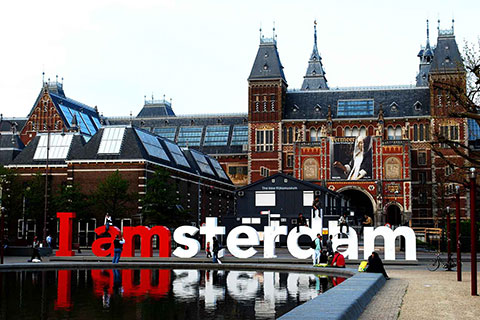
Featured among the world’s top 50 cities for students in the QS Best Student Cities index, Amsterdam is famed for its café culture, liberal attitudes, hordes of cyclists, pretty canals, historic architecture, and the nightlife which makes it a favourite among party-loving holiday-makers. It’s home to a large selection of world-renowned museums and art galleries, including the Van Gogh Museum, and is said to be the perfect place in which to understand the meaning of the Dutch word “gezellig” – roughly translated as “warm, fuzzy, cozy happiness”. In short, Amsterdam is likely to appeal to pretty much everyone.
The Netherlands’ capital is home to the country’s highest-ranking university, the University of Amsterdam (61st in the QS World University Rankings 2020-2021), as well as VU University Amsterdam (236th).
Leiden
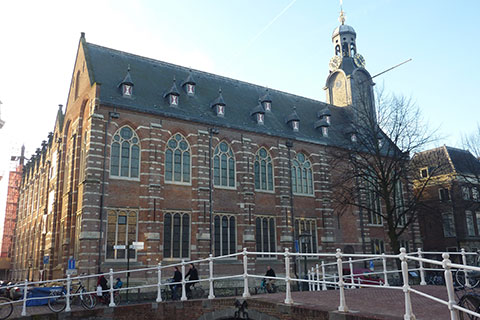
Less than an hour’s drive to the south-west of Amsterdam, Leiden is similarly characterized by scenic canals and historic buildings, as well as strong connections with the European art world – it was, for instance, the birthplace of Rembrandt. Much smaller than Amsterdam, the town is much more centred on its student community, which accounts for a significant chunk of the population and ensures a lively social scene. Leiden University is the Netherlands’ oldest university, founded in 1575, and currently ranks at 128th in the world.
Utrecht
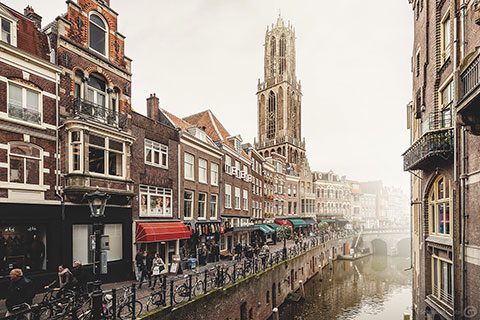
Towards the centre of the country, and just half an hour’s drive from the capital, Utrecht is yet another charming canal-veined historic town. Its ancient city center is one of the oldest in the country, while the surrounding countryside in the province which shares the city’s name is famously beautiful, and peppered with castles and palaces. The city is the fourth most-populous in the Netherlands, with buzzing cultural and nightlife scenes, and is home to the country’s largest and fifth-highest ranked university, Utrecht University (ranks at 121st in the world).
Groningen
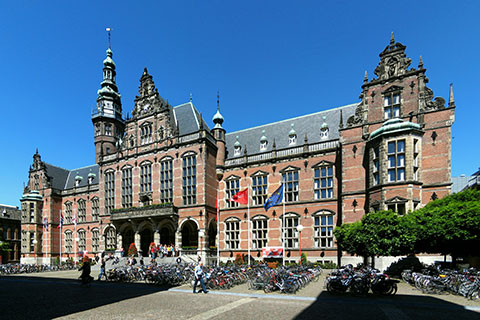
Travelling further towards the north of the country, we reach Groningen, the largest city in this northern part of the Netherlands – though still relatively small compared to Amsterdam or Utrecht. This is another city with a long history of having students at its center, and today students continue to comprise a significant part of the population and local life. There’s a vibrant cultural scene here, as well as the usual attractive gabled houses and canals, and between 2005 and 2007, Groningen was elected "de beste binnenstad" (the best city center) of the Netherlands. The University of Groningen is ranked joint 113th in the world.
Rotterdam
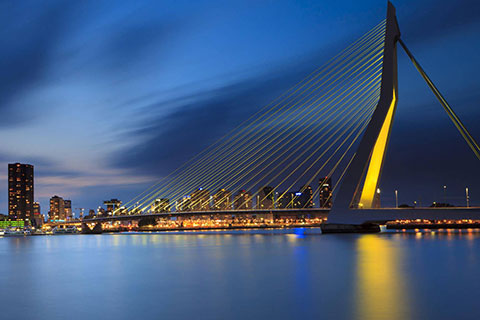
Home of Europe’s biggest port, the Netherlands’ second city Rotterdam stands out from the other cities here due to its distinctly modern feel – the result of damage during World War II, which meant the city had to be largely rebuilt. Its often-striking modern structures make an apt backdrop to its buzzing social scene, famed for music (particularly electronic), nightlife and its multicultural community. The city is home to Erasmus University Rotterdam (ranked 197th in the world), named after the city’s most famous son, the hugely influential scholar Erasmus. Less than 10 miles (or 15km) away is the picturesque town Delft and its prestigious Delft University of Technology (57th in the world).
Maastricht
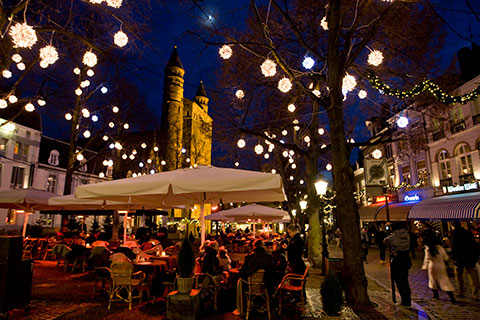
In the south of the Netherlands, close to the Belgian and German borders, Maastricht has a cosmopolitan and pan-European character, with multiple languages commonly spoken, a far-reaching reputation as a gastronomic hub, and a history of playing a key role in the development of the European Union. In contrast to much of the country, it even has some hills. Maastricht University calls itself ‘the most international university in the Netherlands’, with almost half (49%) of its students coming from other countries, representing over 100 different nationalities. Its overall rank in the QS World University Rankings 2020-2021 is 234.
After all, why not put Netherlands as your study destination since the country offers various attractions such as extremely high quality of education and tolerance living society. International environment which plays important role in personal and professional development would be triggered in student’s everyday life. You could find the internationalization within all the Dutch Higher Education Institutions (Research University or University of Applied Sciences), which spread out in 30 cities around the country, including: Den Haag, Eindhoven, Enschede, Nijmegen, Wageningen and many more.
Application, Fees and Visas in The Netherlands
Applying to study in the Netherlands
There are two systems for applying to Dutch universities – directly to the institution or through Studielink, an online centralised application procedure. The path you follow will depend on the university and the course to which you are applying. You may even be required to use a combination of the two, so check carefully with the institution.
Certain oversubscribed courses in the Netherlands are deemed “numerus fixus programmes”. To get a place on one of these courses, you will need to be successful in a lottery – again, talk to the institution for further details. Tuition will be in Dutch or English, and you will need to be able to prove you have a sufficient level of fluency in the relevant language.
Tuition Fees and Living Cost
Tuition fees vary depending on whether or not you are from a country within the European Union, EEA country, Switzerland or Surinam. If you are, the average annual fee start at € 2,168 for the academic year 2021-2022, and if not, you can expect to pay between €6,000 and €15,000 for bachelor’s programmes and for a master’s programme between € 8,000 and € 20,000. However, there are various scholarship options available. For more information, visit our guide to scholarships in Europe.
In terms of daily student expenses and cost of living in the Netherlands, students may spend an average of € 800 - € 1,100 a month. The costs depend on the city where you study, what is included in the rent and the arrangements made by the institution for the housing, and your lifestyle. To save some expenses on food and transportation, you can simply do your own cooking or you can get around town easily on a bike (very typical Dutch!) as a cheap means of transportation.
Scholarship
When is the last time you ever think about country of Windmills and Tulips? As the first non-English speaking country which offer English-thought study program, you would definitely write it on your study destination list. In fact, not only Gouda Cheese and Stroop Waffel knocked out your head, the reputation of Dutch Universities also catches the eyes of the world. 11 out of 14 Research Universities in the Netherlands are in the top 200 world university ranking. Can’t speak Dutch?! No worries! Everyone speaks English and you could enrol in one of 2,100 study programs conducted in full-English.
Dutch government strongly focuses on the internationalisation of their education related. Therefore, support in financing International students to study in the Netherlands is one of their priorities. If you are Indonesian and currently searching about how to finance your study, Dutch government have specialised the relations between the Netherlands and Indonesia through education cooperation. Here is the specific information of scholarships opportunities to study in the Netherlands. More information about study in Holland could be found on the official website of its national organisation for education, Nuffic Neso Indonesia.
Scholarship from Dutch Government:
-
StuNed (Master, Tailor Made Training)
-
Orange Knowledge Programme (Short Course & Masters)
-
Holland Scholarship (Bachelor & Master)
Scholarship from Dutch Higher Education Institution
-
Orange Tulip Scholarship (Bachelor & Master)
Scholarship from Indonesian Government
-
Erasmus+
-
LPDP
-
Beasiswa Unggulan Kemedikbud
-
Beasiswa Unggulan Dosen Indonesia (LPDP – Kemenristekdikti)
-
Beasiswa Kominfo
-
Beasiswa Pusbindiklatren - Bappenas
Visas to study in the Netherlands
As with any nation in the European Union, the visa process differs according to whether or not you are a citizen of another nation in the EU (or Switzerland).
EU nationals:
You do not need a visa to study in the Netherlands.
You will need to register as an inhabitant with the local city council, proving that you have a place to live. You will also need to present your passport and birth certificate.
You must purchase health insurance. This is required by law.
It is advisable, though not compulsory, to register with the Dutch immigration authorities, for which you’ll need to prove you’ve enrolled at a Dutch university, sign a document to say you have sufficient financial means, and show you’ve purchased health insurance.
Non-EU nationals:
Depending on your nationality, you may need to apply for a provisional residence permit, known as an MVV (Machtiging tot Voorlopig Verblijf). The Nuffic website has the relevant information. Your host institution will probably make the actual application for you, but you will need to supply all the necessary documents, which must be in Dutch, English, French or German, or officially translated into one of these languages. As well as basic documentation showing you’re actually enrolled on a course, you will need to prove you have a certain amount per month to support yourself.
Chinese students enrolling on English language courses must also apply for the Nuffic Certificate, which can be done online through the Nuffic Certificate Online Application System, in order to get their MVV.
You will need to apply for a residence permit. Your institution will apply for this on your behalf, which should occur within five days of your arrival in the country. Your permit will be valid for a maximum of 12 months, after which you must renew. Some, but not all, institutions will do this for you, so make sure you check the process.
You must also register with the local Aliens Police (Vreemdelingendienst) within three days of arriving, to whom you must prove that you have somewhere to live and that you have enough money to support yourself during your stay.
You should also register with your local municipality (gemeente).
Purchasing health insurance is mandatory.
Fast fact
-
Part of the Kingdom of the Netherlands (together with the Caribbean islands of Aruba, Curaçao and Sint Maarten)
-
Constitutional parliamentary monarchy with bicameral legislature, headed by prime minister (currently Mark Rutte)
-
Population: approx. 17.4 millions
-
Borders Belgium, Germany and the North Sea
-
Part of the Benelux economic union, along with Belgium and Luxembourg
-
Capital city: Amsterdam (but The Hague is the seat of the national government, as well as the location of the International Courts of Justice)
-
Official language: Dutch, however 90% of Dutch society speak English fluently
-
One of the flattest countries in the world; the highest point is only 321 meters above sea level
-
The Netherlands boasts over 34,000 km of bicycle tracks – and this is a conservative estimate.
-
Dutch people are the tallest in Europe, on average.
-
Currency: Euro (€)
-
Central European Time (UTC+1) switching to Central UTC+2 in summer
-
International dialling code: +31
-
1/3 of the total area of the Netherlands sit below sea level. The Netherlands is world 2nd largest global agricultural exporter after the United States
When is the last time you ever think about country of Windmills and Tulips? As the first non-English speaking country which offer English-thought study program, you would definitely write it on your study destination list. In fact, not only Gouda Cheese and Stroop Waffel knocked out your head, the reputation of Dutch Universities also catches the eyes of the world. 13 out of 14 research universities in the Netherlands are in the top 200 world university ranking. Can’t speak Dutch?! No worries! Everyone speaks English and you could enroll in one of 2,100 study programs conducted in full-English.
Dutch government strongly focuses on the internationalization of their education-related. Therefore, support in financing International students to study in the Netherlands is one of their priorities. If you are Indonesian and currently searching about how to finance your study, Dutch government have specialize the relations between the Netherlands and Indonesia through education cooperation. Here is the specific information of scholarships opportunities to study in the Netherlands. More information about study in Holland could be found on the official website of its national organization for education-related, Nuffic Neso Indonesia
Orange Tulip Scholarships (OTS)
Focus Scholarship: Bachelor, Master
Competition: Designated country: Indonesia
Scholarship Coverage: Partial Scholarship
Different from StuNed and OKP, Orange Tulip Scholarship is a partial scholarship offered for Indonesian citizens and several countries where Nuffic Neso offices are located. The scholarship program is funded by Dutch higher education institutions to open up more opportunities in the Dutch study. You could consider applying for this scholarship if your targeted university is listed in the OTS scheme (per country may vary). Once you have registered your study program the university, you could apply for the OTS scholarship by sending your documents to Neso office. OTS would be awarded in the form of tuition fee waiver or living allowance depends on its scheme (per university).
Criteria
- Indonesian Citizens (OTS Indonesia)
- Not currently studying or working in the Netherlands
- Application for targeted study program at one of the Dutch universities has started or has been admitted proven by Letter of Acceptance
- Meet the special conditions required by the Orange Tulip Scholarship scheme (per university may vary)
Holland Scholarships
Focus Scholarship: Bachelor, Master
Competition: worldwide
Scholarship Coverage: Partial scholarship
The scholarship is made happened by Ministry of Education, Culture and Science in collaboration with the Dutch research universities and universities of applied sciences Netherlands to support more and more international students to experience not only Dutch society but living in the middle of ‘the world’ experience. The scholarship is intended for international students from outside the European Economic Area (EEA) who want to pursue a bachelor or master’s degree studies in the Netherlands. The benefit of the scholarships includes EUR 5000 for the first year of study. Similar to Orange Tulip Scholarships, make sure that your targeted university is listed in the scheme and start the application directly to the university which usually could be submitted along with your study program application.
Criteria
- Non-EEA nationality
- You have started admission process at Holland Scholarship’s partner universities for a full-time bachelor’s or master’s programme
- You meet the specific requirements of the institution of your choice. You can find these on the website of the institution
- You do not have a degree from an education institution in the Netherlands.
Studeren in Nederland (StuNed)
Focus Scholarship: Master, Tailor-Made Training (TMT)
Competition: Indonesia
Scholarship Coverage: Full Scholarship / Co-funding scheme
StuNed scholarship is a fully funded scholarship program for excellent candidates who would like to pursue their master’s degree and one distinctive program for institution called Tailor-Made Training. Since it is a one and only bilateral scholarship program between the Netherlands and Indonesia, selection committee would take it to account these priority areas:
- Sustainable Entrepreneurship - Circular Economy
- Security and Rule of Law
- Agro-Food and Horticulture
- Water Management
Candidate who has been accepted to one of Dutch Universities in the Netherlands with a study program related to the priority area would benefit a plus point of chance to be awarded. They do not stop there! A strong motivation and excellence skill set, academic and non-academic record also strongly considered. Make sure that you could indicate your strength, vision, and mission in your motivation letter. Interview will be included in the 2nd round of the selection process.
Criteria
- Indonesian Nationality and living in Indonesia proven by ID or Passport
- Obtained minimum Bachelor’s/ D4 degree with minimum GPA 3,0
- Received unconditional Letter of Acceptance from one of the Dutch Higher Education Institutions
- Obtained English proficiency certificate with minimum score of IELTS 6,5 / TOEFL iBT 90
- Young professionals with leadership quality and entrepreneurial potential (preferably 3 – 4 years of relevant working experience)
- Maximum 40 years old by 31 December at the year of registration
- Not applicable for those who are currently studying or already have a master’s degree
- Not applicable for employees of multinational organisation and international donor
Orange Knowledge Programme (OKP)
Focus Scholarship: Institutional Cooperation, Tailor-Made Training (TMT) & Individual Scholarships (Master & Short course)
Competition: Developing Country
Scholarship Coverage: Full Scholarship
The Orange Knowledge Program (OKP), formerly Netherlands Fellowship Programme (NFP) is a scholarship programme initiated and fully funded by the Dutch Ministry of Foreign Affairs. The scholarship program consists of 3 components; individual scholarships for mid-career professionals; TMT; and institutional partnerships between knowledge institutions. Targeted candidates are professionals who work, live, and hold a citizenship in one of the 53 countries on the OKP Country list. To be able to apply for this type of scholarships, the candidate must be nominated by his/her organisation.
Some of the priority themes are Security and Rule of Law, Food and Nutrition Security, and Water. Please note that not all Dutch higher education institutions and study programs offer OKP scholarship, you could find the information on university’s website. The application should be sent directly to the university before the deadline (may vary).
*) Indonesia is no longer a participating country for individual scholarship selection as of June 2020.
Criteria
- hold a nationality of, working and living in one of the 52 OKP partner’s countries;
- Provide employer’s statement that complies with the format Nuffic has provided.
- must not be employed by an organisation that has its own means of staff-development.
- must have a government statement that meets the requirements of the country in which the employer is established (if applicable).
- must have an official passport valid at least three months after the submission date of the registration form by the candidate

